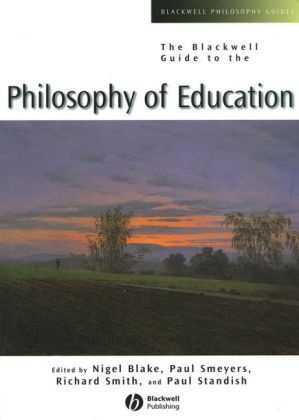Read more
Informationen zum Autor Nigel Blake teaches at the Open University, Paul Smeyers at the University of Leuven in Belgium, Richard Smith at the University of Durham, and Paul Standish at the University of Dundee. They originally came together to explore their shared interest in postmodern issues and poststructuralist theory in relation to education. Their first collaboration. Thinking Again Education after Postmodernism (1998), laid the foundations, for other projects, including Education in an Age of Nihilism (2000). They have also addressed the educational influence of the European Union, reform in higher education, issues of online education and of moral education in their joint projects. Paul Smeyers at the University of Leuven in Belgium. Richard Smith at the University of Durham. Paul Standish at the University of Dundee. Klappentext Philosophy of education has now established itself throughout the world as a theoretically significant and practically vital discipline. In this important survey, an international group of leading philosophers charts the development of the field in the twentieth century and points to important questions for its future. Each chapter has been written as a collaboration between authors in order to emphasize the diversity of thought, and where appropriate, the dissent and debate that is intrinsic to the field. The contributors explore social and cultural theories, politics and education, philosophy as education, teaching and curriculum, and ethics and upbringing. The Blackwell Guide to Philosophy of Education is state-of-the-art map to the field as well as a valuable reference book. Zusammenfassung Philosophy of education has established itself as a theoretically significant discipline. In this survey of a reinvigorated field! an international group of writers chart the development of the philosophy of education in the 20th century and point to questions for the future. Inhaltsverzeichnis Notes on Contributors. Foreword. (Paul Hirst). Introduction. (Nigel Blake, Paul Smeyers, Richard Smith, and Paul Standish). Part I: Social and Cultural Theories. 1 Pragmatism and Education. (Jim Garrison and Alven Neiman). 2 Critical Theory and Critical Pedagogy. (Nigel Black and Jan Masschelein). 3 Postmodernism/Post-structuralism. (Michael Peters and Kenneth Wain). 4 Feminism, Philosophy and Education. Imagining Public Spaces. (Maxine Greene and Morwenna Griffiths). Part II: Politics and Education. 5 Liberalism and Communitarianism. (Eamonn Callan and John White). 6 Democratic Citizenship. (Penny Enslin and Patricia White). 7 Education and the Market. (David Bridges and Ruth Jonathan). 8 Multicultural Education. (Pradheep Dillon and J. Mark Halstead). Part III. Philosophy as Education. 9 The Activity of Philosophy and the Practice of Education. (Pádraig Hogan and Richard Smith). 10 Critical Thinking. (Sharon Bailin and Harvey Siegel). 11 Practical Reason. (Joseph Dunne and Shirley Pendlebury). Part IV: Teaching and Curriculum. 12 Higher Education and the University. (Ronald Barnett and Paul Standish). 13 Information and Communication Technology. (David Blacker and Jane McKie). 14 Epistemology and Curriculum. (Andrew Davies and Kevin Williams). 15 Vocational Education and Training. (Paul Hager and Terry Hyland). 16 Progressivism. (John Darling and Sven Erik Nordenbo). Part V: Ethics and Upbringing. 17 Parents and Children. (Paul Smeyers and Colin Wringe). 18 Autonomy and Authenticity in Education. (Michael Bonnett and Stefaan Cuypers). 19 Changing Notions of the Moral and of Moral Education. (Nel Noddings and Michael Slote). 20 Education in Religion and Spirituality. (Hanan Alexander and...

